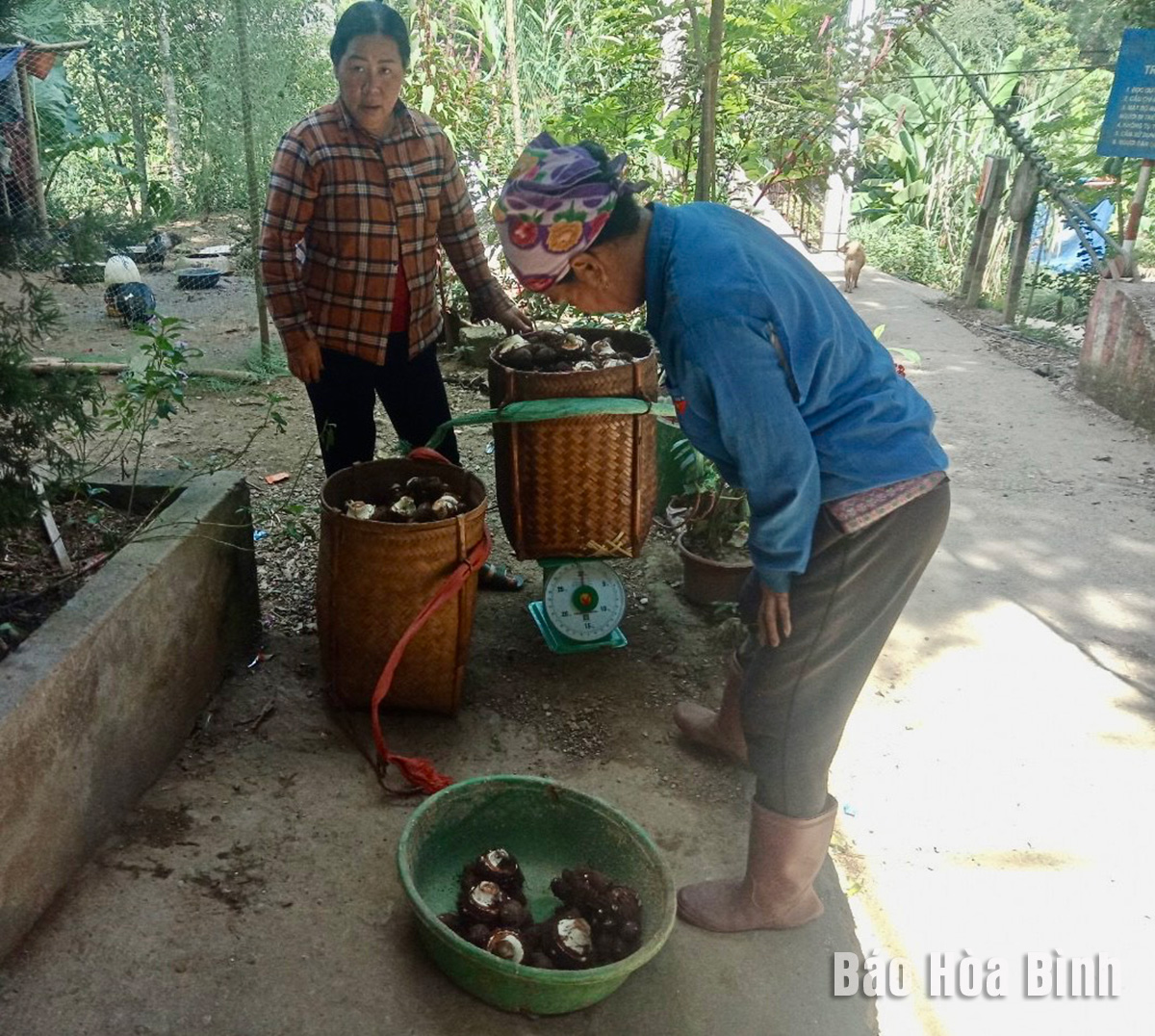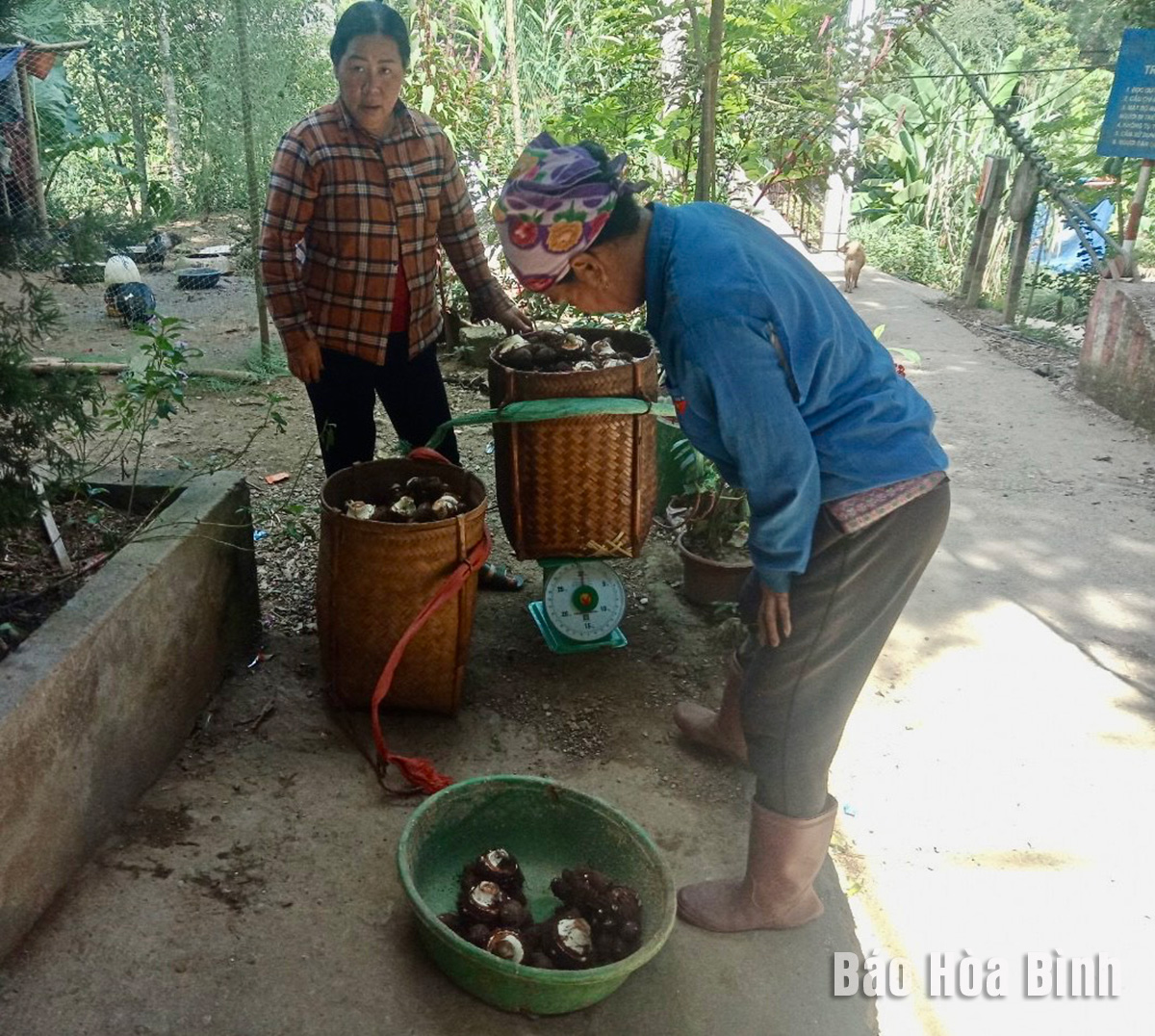
The start of winter also marks the harvesting season of taro in Son Thuy commune (Mai Chau district). The local tuber has gained popularity thanks to its good taste. It was granted the "Phuc San Taro" trademark by the National Office of Intellectual Property of Vietnam in 2020.
Cultivating taro brings good income for people in San Sop hamlet, Son Thuy commune (Mai Chau district).
Compared with taro grown in other localities, Phuc San taro is bigger and has better taste thanks to favourable weather and soil conditions. The area under taro cultivation in Mai Chau district has been expanding, contributing to raising the value of their agricultural production.
Dinh Van Thanh, who resides in Not hamlet, said his family has grown taro on 1ha of land since 2020. With guidance from agricultural extension staff, this year’s taro plants yield bigger tubers at larger volume than in previous years, he said, adding that the family has harvested more than 400kg of taro so far, earning over 13 million VND (about 535 USD).
Currently, the commune has nearly 20ha under taro cultivation, concentrated in San Sop and Not hamlets, with each ha yielding over 40 tonnes of tubers. Taro is harvested from late September to early January of the following year.
Ha Van Anh, a resident of San Sop hamlet, said that previously his family grew taro in a small area. However, they have expanded the cultivation area to nearly 2ha due to its price and popularity. This year, taro is sold at prices ranging from 25,000-40,000 VND per kg.
To turn taro into a key commodity product, the commune has been promoting the product on e-commerce trading floors, connecting with businesses that buy the produce and giving guidance to farmers on how to plant, harvest and preserve, ensuring the products meet safety standard, said Ha Van Duc, Chairman of Son Thuy Commune Farmers' Association.
In the coming time, the commune will continue to complete planning for production areas, help farmers to improve quality, output, and meet market demand. It will encourage people to expand taro cultivation areas and strive to build a sustainable trademark for Son Thuy taro.
It can be seen that the granting of "Phuc San Taro" trademark has boosted production and business development. Farmers have complied with the production process to ensure product quality, thus creating more jobs, and improving their income while contributing to hunger eradication and poverty reduction in the locality.
According to data from the Hoa Binh Provincial Party Committee, the industrial production index for the first six months of 2025 is estimated to have increased by 20% compared to the same period last year. This marks the highest year-on-year growth rate for this period since 2020.
In the first six months of 2025, Hoa Binh province’s export turnover was estimated at 1.145 billion USD, marking an 18.11% increase compared to the same period in 2024. Import turnover was estimated at $ 804 million, a 17.15% increase, which helped the province maintain a positive trade balance.
The lives of the ethnic minority farmers in Tan Lac district have gradually improved thanks to the new directions in agricultural production. This is a testament to the collective strength fostered through the professional associations and groups implemented by various levels of the district’s Farmers’ Union.
With the motto the "product quality comes first,” after nearly one year of establishment and operation, Muong village’s Clean Food Agricultural and Commercial Cooperative, located in Cau Hamlet, Hung Son Commune (Kim Boi district), has launched reputable, high-quality agricultural products to the market that are well-received by consumers. The products such as Muong village’s pork sausage, salt-cured chicken, and salt-cured pork hocks have gradually carved out a place in the market and they are on the path to obtaining the OCOP certification.
In the past, the phrase "bumper harvest, rock-bottom prices" was a familiar refrain for Vietnamese farmers engaged in fragmented, small-scale agriculture. But today, a new spirit is emerging across rural areas of Hoa Binh province - one of collaboration, organisation, and collective economic models that provide a stable foundation for production.
Maintaining growing area codes and packing facility codes in accordance with regulations is a mandatory requirement for agricultural products to be eligible for export. Recently, the Department of Agriculture and Environment of Hoa Binh province has intensified technical supervision of designated farming areas and packing facilities to safeguard the "green passport" that enables its products to access international markets.



